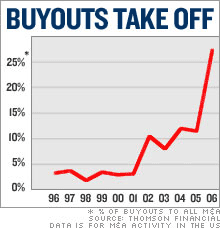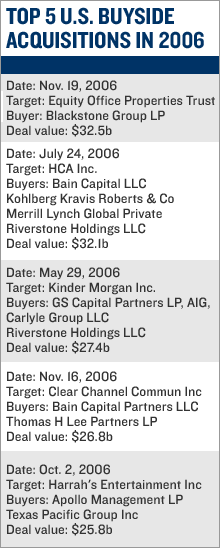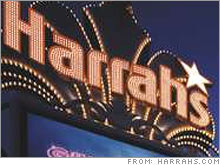Private equity in 2007Thanks to cheap debt and aggressive pension funds, 2006 was the year of private equity. So what's in store for these dealmakers in the year ahead?(Fortune Magazine) -- Every few years there's a shift in the type of financier that becomes the rock-star embodiment of capitalism unfettered. The '80s icon was the investment banker. The '90s belonged to the venture capitalist. And if the first years of the new millennium went to the hedge fund manager, the player who now gets all the love is the private equiteer. Once the scourge of companies and CEOs, the buyout firms are now wooed by potential acquirees and hailed as corporate alchemists who can take over a company, work their magic on its operations and then exit to massive profits in an IPO. 
 The numbers illustrate the ascendance of PE. A startling 1,010 U.S. companies were taken private last year through Dec. 13 - compared with 664 in 2004 and 324 in 2001 - according to Dealogic. The total pricetag for the 2006 buyout splurge: $371.4 billion. And that didn't even include the year-end volley-and-thunder of Harrah's (Charts) ($17.1 billion), Biomet (Charts) ($11 billion) or Realogy (Charts) ($6.7 billion). Every week in 2006, it seemed, private-equity firms announced what would have been the largest deal of the year in any other era. "[We are] the face of 21st-century American capitalism," says Carlyle Group co-founder David Rubenstein. That proclamation would've been outlandish not long ago; now it seems only mildly self-serving. Carlyle's 2006 highlights included pieces of the $14.6 billion Kinder Morgan (Charts) acquisition and the $17.6 billion Freescale Semiconductor (Charts) deal. "American capitalism used to be General Motors and Ford and IBM," says Rubenstein. "Now it's Blackstone and Texas Pacific Group and KKR and Carlyle because we're doing so many things to move the economy." Several factors have fueled the PE boom. Lenders are offering the buyout firms money on the cheap and with more relaxed loan restrictions than in the past. Institutional investors, notably pension funds, have been funneling more money into buyout firms. "In the U.S., pension fund managers were allocating 4 percent [to private equity] four or five years ago. Now it's closer to 6 percent," says Erik Hirsch, chief investment officer of Hamilton Lane, which advises pension funds holding some $55 billion in assets. Finally, some suggest Sarbanes-Oxley has been private equity's silent partner, driving companies away from the regulatory web that comes with public ownership and into the arms of PE firms. Veteran dealmakers like Quadrangle's Steve Rattner think that these heady days, in which every deal seems like a winner, can't continue. "There is no question that a meaningful number of these deals will crash and burn," he says. "I don't know which deals will stumble, because they mostly look fine at the moment. But it would be a complete historical aberration for there not to be reasonably significant default rates on these deals." For now, though, even the whiff of private-equity interest can goose a company's stock. Consider 3Com (Charts), which surged 15 percent on one October day on rumors that the tech company was a buyout target - this despite the fact that analysts doubted a deal would happen and that 3Com's ongoing cash-burn problem made it an unlikely takeover candidate. |
|

